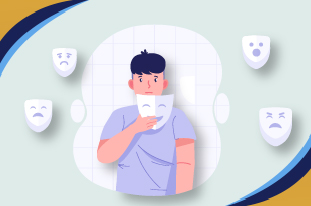What is an acute stress reaction? If this is the kind of question that is wandering in your mind, then you are already in the right place at the right time. This is because we are about to discuss everything related to how acute stress response comes into existence.
Defining Acute Stress Reaction
It is a type of reaction that usually occurs in response to the onset of acute stress disorder (ASD). ASD itself occurs as a response to a traumatic event rather quickly (like in a week) and usually lasts for three days but can persist for up to a month. Acute means quick, which means that the symptoms develop quickly and do not last long after a traumatic event like a serious accident, or sudden bereavement. The acute stress reaction symptoms are
not dissimilar to post-traumatic stress disorder (PTSD) in terms of the symptoms considering it can develop if the related symptoms persist for a longer period than associated with an acute stress reaction.
Read More: Acute Stress Disorder Vs. PTSD: Understanding The Difference
The Causes of Acute Stress Reaction
Around 6 to 33% of the population who do some kind of combat are bound to experience ASD at some point in their lives, according to the US Department of Veteran Affairs. Acute stress reactions that have been experienced by people tend to be victims of terrorist incidents, major disasters, or war. Similarly, this also puts military personnel at higher risk as a result of living through extreme experiences during conflicts. As mentioned before, traumatic events that create intense fear, horror, or helplessness, can cause ASD to include:
- death of someone close to you aka bereavement
- threat of death to oneself or others
- threat of serious injury to oneself or others
- threat to the physical or biological health of oneself or others
Acute Stress Response Symptoms
The acute stress response symptoms can be separated into two different types: psychological and physical (1). Each of these can be debilitating in some form or another. The psychological acute stress disorder symptoms are:
- Anxiety
- Low or depressive mood
- Extreme irritability
- Emotional ups and downs
- Poor sleep hygiene
- Poor concentration and focus
- Social anxiety
- recurrent dreams or flashbacks, which tend to be intrusive and unpleasant.
- Triggering memories that cause stress and anxiety, which may lead to avoidance behavior
- Reckless or aggressive behavior that can be considered self-destructive
- Feeling emotionally numb and detached from others, even friends and family
The physical acute stress disorder symptoms are described below and are usually brought on by hormonal changes, for example, the release of a stress hormone called adrenaline (epinephrine) in response to the acute dress reaction:
- Palpitations, which sound like a “thumping heart”
- Nausea, which is the urge to vomit
- Chest pains
- Headaches or migraines.
- Abdominal pains
- Breathing difficulties

Reexperiencing The Traumatic Event
One of the most major acute stress disorder symptoms is the persistent reexperiences of the traumatic event brought on by ASD and also considered to be an onset of PTSD:
- The sufferer might be suffering through seeing recurring images, thoughts, nightmares, illusions, or flashback episodes of the traumatic event
- Feeling like you’re reliving the traumatic event persistently
- Distressed when something reminds you of the traumatic event
Risk Factors Associated With Acute Stress Reaction
The risk factors associated with post-traumatic stress disorder also apply to ASD. Consistently, there is predominant evidence that ASD is exacerbated through the presence of the following (2-4):
- History of another trauma or pre-trauma psychiatric disorder
- Persistent traumatic exposures pre-exposure
- ASD seems to prefer the female gender
- Higher severity and intensity of trauma
- Neuroticism (also called negative emotions)
- Avoidant coping and avoidance behavior
Read More: Understanding Episodic Acute Stress: Causes, Symptoms, And Management
The Relationship Between Acute Stress Reaction and PTSD
PTSD, or post-traumatic stress disorder, is a persistent form of ASD that often turns into it. It is not true the other way around(5). This phenomenon is predominantly evidenced in severely injured US troops who were assessed at 1-month, 4-month, and 7-month intervals respectively. Research also evidenced the fact that 78.8% of those who had a disorder at 7-month did not attract a diagnosis at 1 month. There is also a trend of delayed emergence, which was found in the screening of military populations who had been experiencing an increase in the symptoms during the first six months following deployment (5). This likely suggests that sufferers of acute stress disorder symptoms will see those symptoms evolve into PTSD or delayed onset PTSD. Therefore, treatment is promptly needed as PTSD has more dire consequences due to being more persistent and severe and tends to stay for a very long time and at times is not even curable.
Treatment of Acute Stress Reaction
Acute stress reaction is extremely curable if the treatment is done the right way. There are two suitable ways you can do that. In terms of psychotherapy (talk therapy), a trauma-based CBT (Cognitive behavioral therapy – A goal-based and short-term psychotherapy, where the patient tries to come to terms with the negative patterns that lead to problematic behavior when suffering from a mental condition) can be used to treat acute stress disorder symptoms or anything related to some kind of stress reaction for that matter. A trauma-based CBT involves, trauma-focused CBT involves education on how your body responds to trauma and stress, symptom management skills, identification and reframing of problematic thinking patterns, and exposure therapy.
When it comes to medication, Selective serotonin reuptake inhibitors (SSRIs) or Serotonin and norepinephrine reuptake inhibitors (SNRIs), both of which tinker with neurotransmitters in our brain to induce positive effects, can be used. Although, there is minimal evidence supporting the use of medications to treat acute stress disorder.
Additionally, lifestyle changes like stretching and exercise are beneficial, but self-soothing techniques such as counting one’s own breaths, meditating, or self-hypnosis can also be equally helpful.
Read More: Trauma Brain Vs Normal Brain: How Trauma Affects The Way We Live
Wrapping Up!
We have spewed everything about an acute stress reaction on this page, and we hope you absorbed this knowledge properly. If it is a treatment that you are looking for to treat it or other mental conditions like adjustment disorder, ADHD, depression, OCD, mood disorder, panic disorder, MDD, or bipolar disorder through treatments described above and the alternative ones like telehealth psychiatry.
























